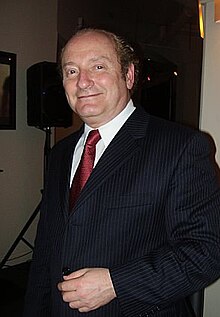Robert C. Merton
Robert Cox Merton (born July 31, 1944 in New York ) is an American economist and university professor . His main area is the quantitative analysis of the capital market with methods of modern stochastics , based on a modeling of the future price development of capital goods as a continuous Brownian movement . Its best-known result is the confirmation that the Black-Scholes formula for determining option values also applies in the case of continuous time. For this he received the Nobel Prize in Economics in 1997 together with Myron S. Scholes . He made similar contributions to the consumer-investment problem and the use of option pricing models as insolvency forecasting procedures .
Life
Robert C. Merton is the son of Robert K. Merton . His mother, Suzanne Carhart, came from a traditional Methodist / Quaker family from New Jersey . After his mother's maiden name, Robert C. Merton is also known under the name Robert Carhart Merton .
As a child he was interested in mathematics and finance. He studied at the School of Engineering and Applied Science of Columbia University . After graduating in applied mathematics, he went to the California Institute of Technology in 1966 to do a doctoral thesis, but in 1967 he decided to study business administration at the Massachusetts Institute of Technology . Here he was greatly impressed by Paul Samuelson , whose assistant he became. After receiving his doctorate in 1970, he taught economics at the MIT Sloan School of Management until 1988 when he was appointed to Harvard University .
At Sloan School he met Myron Scholes and Fischer Black . Fundamental work on the valuation of stock options arose from their collaboration. The method is now known as the Black-Scholes model . The name Merton-Black-Scholes-Method would be fairer, but it has not caught on. However, all three were honored at the Nobel Prize ceremony. Fischer Black had already died, otherwise he would have been a co-winner.
In 1986 Merton was president of the American Finance Association . In 1986 he was elected to the American Academy of Arts and Sciences , and in 1993 he was appointed to the National Academy of Sciences .
Merton used the financing models he found, among other things as a co-founder of Long-Term Capital Management (LTCM). This hedge fund , founded in 1994, developed and marketed innovative financial products. By 1998, according to a published estimate, LTCM had entered into contracts totaling one trillion dollars; it was derivatives , swaps and other complex financial instruments . LTCM came under increasing pressure due to the deteriorating macroeconomic conditions in the emerging countries , the Russian crisis and bad speculation with Italian government bonds. It was feared that the speculation would cause a chain reaction that could lead to a collapse of the international financial system. In 1998, the worst was averted in a rescue operation that was unique worldwide; the fund was finally dissolved in 2000.
In 2002 Merton intervened in the debate about the accounting of stock options for employees. In previous years, the granting of stock options was a popular means of retaining employees in Internet start-ups. It is common practice to post these options with no effect on income and not as an expense (i.e. affecting income). Some economists hold this practice partly responsible for the fact that around the year 2000 there was an inflation of share prices and the subsequent bursting of the speculative bubble. Merton was in favor of posting stock options granted as an expense.
Works
- Robert Merton, Zvi Bodie: Finance , Prentice-Hall, New Jersey 1998.
- R. Merton, D. Crane, K. Froot, S. Mason, A. Perold, Z. Bodie, E. Sirri, and P. Tufano: The Global Financial System: A Functional Perspective , Harvard Business School Press, Boston 1995.
Web links
- Information from the Nobel Foundation on the 1997 award ceremony for Robert Merton
- His homepage at Harvard University
Individual evidence
- ↑ Cihan Bilginsoy: A History of Financial Crises: Dreams and Follies of Expectations . Routledge, 2015, ISBN 978-0-415-68724-9 (English). Here page 353.
| personal data | |
|---|---|
| SURNAME | Merton, Robert C. |
| ALTERNATIVE NAMES | Merton, Robert Cox (full name); Merton, Robert Carhart |
| BRIEF DESCRIPTION | American finance scientist and Nobel Prize winner |
| DATE OF BIRTH | July 31, 1944 |
| PLACE OF BIRTH | new York |
